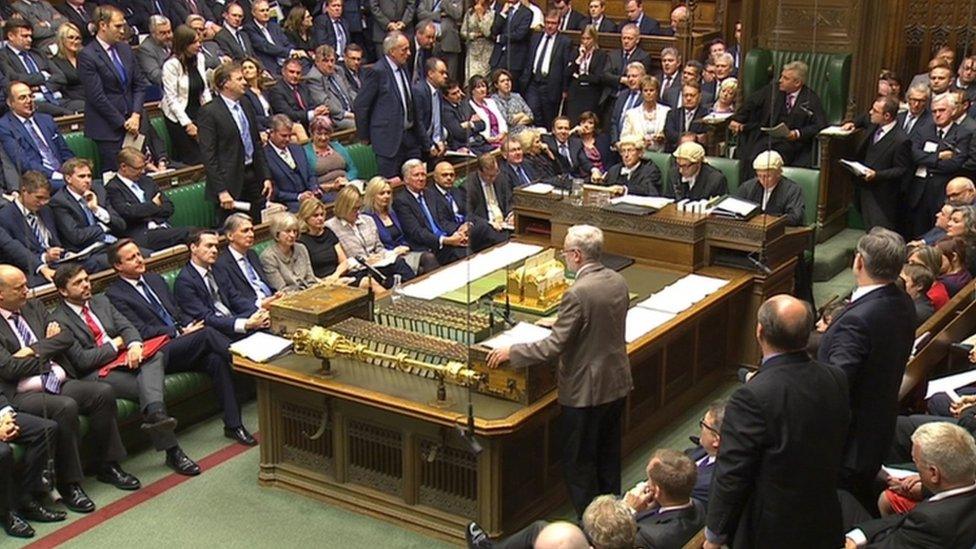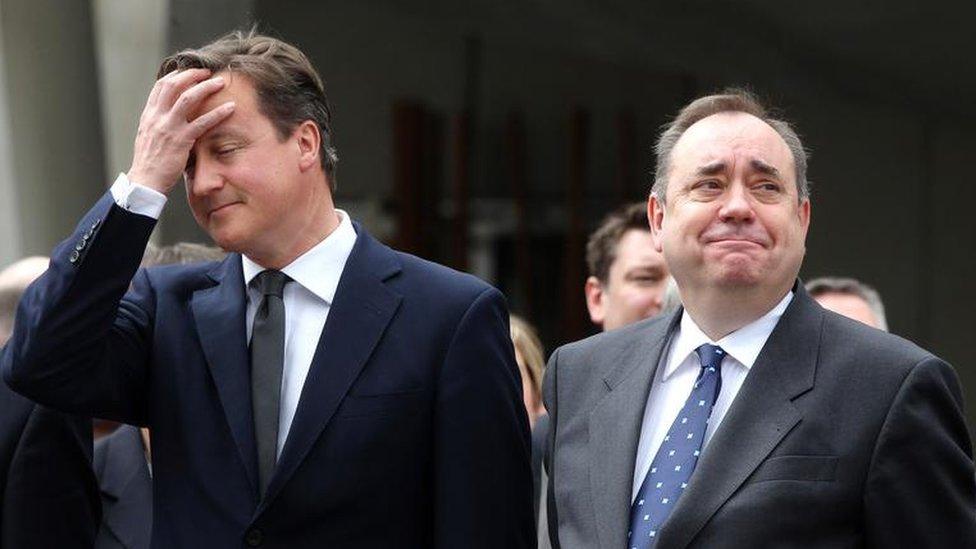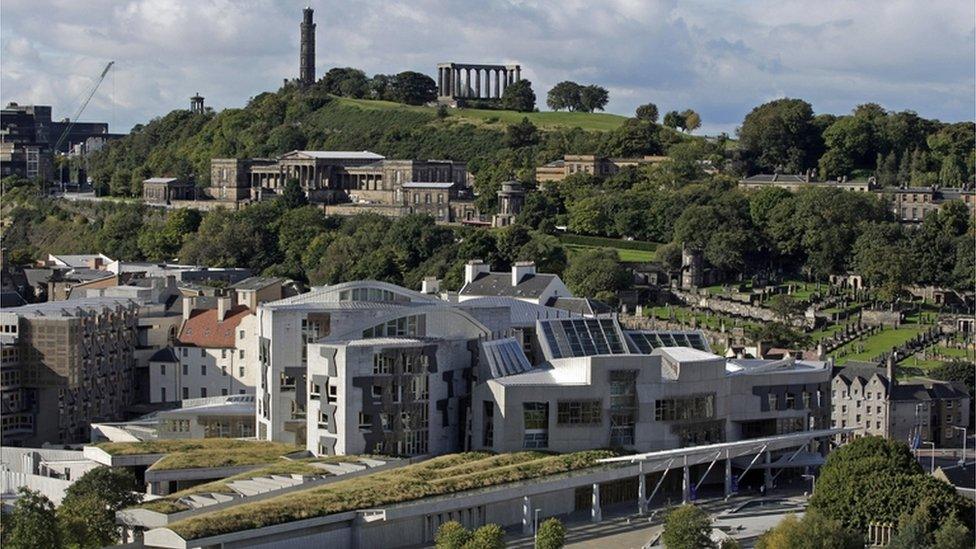Alex from Strichen and Dave from Chipping Norton
- Published

Jeremy Corbyn asked questions emailed to him from voters during PMQs in the Commons on Wednesday
Jeremy Corbyn, it seems, has already made a difference to Scottish politics. Only in office for a few days and yet, at Holyrood, they are cheerfully satirising his parliamentary style.
You know? When he based his questions to the prime minister on suggestions emailed in from members of the public. Marie, Paul and others.
Nicola Sturgeon seemed to feel that there was an absence of direction in the questions lobbed her way by Labour's Kezia Dugdale. Were they about education? Were they about independence? (They were about both, simultaneously.)
Perhaps, suggested the FM with a mischievous grin, Ms Dugdale might follow the approach of Jeremy Corbyn and ask the audience.
'Moan and groan'
But Ms Dugdale was a match for the FM on parody. After Ms Sturgeon had delivered an answer accusing Labour of being inclined to "moan and groan", Ms Dugdale detected an echo from the recent past.
That answer, she opined, sounded "like it had been emailed in by Alex from Strichen." (Home ground for Ms Sturgeon's predecessor, since you ask.) Ms Sturgeon retorted that Ms Dugdale seemed destined to "go the same way as Jim from Eastwood". (Got that one? Good.)
Ruth Davidson was not to be left out. The Conservative leader customarily opens by asking when the FM will next meet the PM (which allows her to ask a supplementary about pretty well anything.)
Today, though, she noted that "Dave from Chipping Norton" wondered when Ms Sturgeon might next pitch up at his door. Ms Sturgeon noted, again drolly, that she had always suspected that the Scottish Tory leader took her directions from Dave.

Dave from Chipping Norton and Alex from Strichen were both name checked at FMQs
Enough? Yes, I agree. I only recount these tales to give you a sense of a slightly surreal session of questions to the FM. Perhaps they were all influenced by memories of the collective emotion and frenzy, this time a year ago.
So where are we now on the prospect of a further referendum? Alex from Strichen seems to feel that the wait may be truncated. He suggested at Westminster today that a divided Labour Party under Mr Corbyn would entrench the Tories in UK power - and thus encourage the Scots to opt for a second shot at independence.
This is just one in a series of helpful suggestions delivered by Mr Salmond and others. Sundry triggers for a further poll include: British exit from the EU without Scottish consent; further unwarranted austerity; failure to deliver on the Vow; and the upgrading of Trident.
Ms Sturgeon - who will take the decision on what to feature in the SNP manifesto for next May's elections - has tended to keep her counsel although she too has mentioned Brexit as an issue which might merit a rerun.
However, Ms Sturgeon's tone has also changed just a little. In a BBC debate in Aberdeen in April, she talked of requiring a change in material circumstances before contemplating a second plebiscite. At the time, the talk was of Brexit or some comparable change in the body politic rather than simply the passage of time or variation in opinion polls.
Today, though, Ms Sturgeon's first point was that it would be wrong to discount changes in public opinion as a factor. To be quite fair, she also placed that in the context of material change.
Uncharitable guffawing
She said the decision would be driven by democracy. Which prompted some decidedly uncharitable guffawing from the opposition benches.
What, they seemed to be saying, was the referendum if not an exercise in democracy? That point was made strongly in a speech by the Scottish Secretary David Mundell. He said that Ms Sturgeon would have claimed a one vote victory on a lower turnout last year as an ineluctable mandate for independence.
Yet, he said, she was apparently prepared to "set aside" the votes of two million Scots "as an unfortunate but peripheral setback on the road to independence."
Further, he noted that both Ms Sturgeon and Mr Salmond had referred to the referendum as a "once in a lifetime" or "once in a generation" opportunity. Further still, he argued that speculation about another poll breached the spirit of the Edinburgh Agreement signed by the Scottish and UK governments.
To which, there are a number of replies. Firstly, the Scottish government argues that the Edinburgh Agreement did not preclude a further referendum at some point. It simply committed both sides to respecting the result of the referendum and implementing the consequences. This, say Scottish Ministers, they have done.
The "lifetime" and "generation" stuff is somewhat trickier for the SNP. In essence, they argue that it cannot be the case that they are completely hamstrung by comments made during a campaign when circumstances have palpably altered. We are back to "material change".
In sum, they are deploying the view attributed to John Maynard Keynes. "When the facts change, I change my mind. What do you do Sir?"
To be clear, this dispute is not purely about process. It is about appealing to the Scottish people. Ms Sturgeon stresses that the people will decide - although, presumably, the issue would only arise in the first place if initiated by the FM, her government and party.

The UK government may make a move aimed at clarifying the permanence of the Scottish Parliament
Put it this way. If David Mundell is right that many people would be outraged by a rerun, then presumably that would be reflected in the result of any future referendum. It might also preclude Ms Sturgeon from calling such a poll in the first place.
However, if Nicola Sturgeon is right that popular opinion has changed - whatever the trigger - then presumably she will be emboldened to hold a ballot and to anticipate victory.
The people will indeed decide. The debate - the substantive debate right now - is whether there would be justification and sense in giving them a further chance.
Another point. Mr Mundell looks set to make amendments to the Scotland Bill when it returns to the Commons in October. He will, I believe, seek to address the concern that the Bill presently features an effective UK veto on Scottish welfare provisions. He will change the wording.
Popular consent
There may be a move to devolve abortion law: Mr Mundell seemed generally supportive, with caveats, when I asked him about that today. There may be something on the permanence of the Scottish Parliament.
But, after that, after the Bill is an Act? After a likely deal on the fiscal framework? (Mr Mundell says Scottish Ministers are bluffing when they say they might block the entire package if the money sums are wrong. They are adamant they are not - but hope for agreement.)
At that point, says the Scottish Secretary, the package is done. Tied up. Finis. He would not intend a Scotland Bill 2016, 17, 18….unless for minor tidying.
Short of independence, that would be it - the structure for Scotland's governance. The settled will, if you like, to revive a former phrase. Mr Mundell forecast that the Scotland Bill would be seen as a big deal once its provisions on tax and the rest are put in place.
Which again prompts the issue of popular consent. If people are genuinely impressed by the revised devolutionary set-up, then presumably they will turn away from the option of independence. If not…